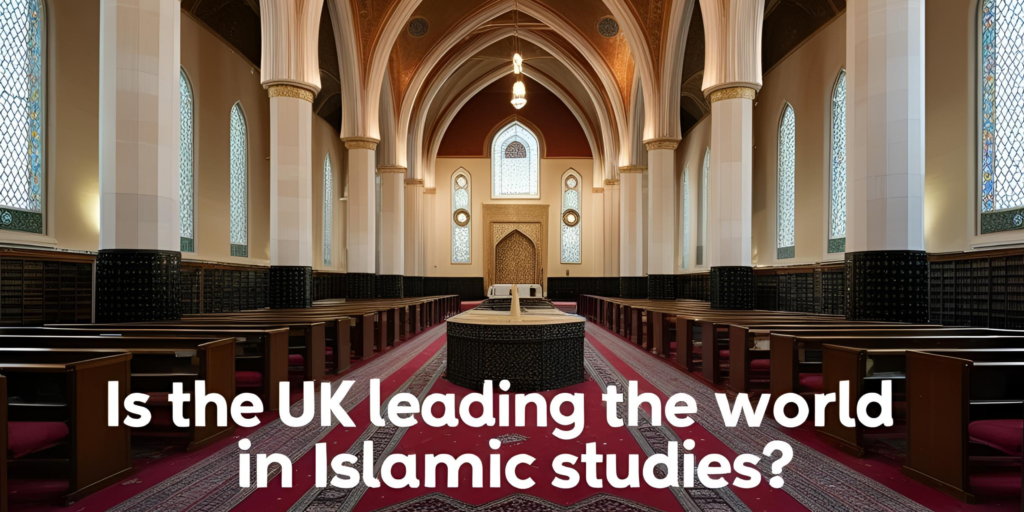Islamic scholarship in the United Kingdom is more than a field of study. It is a lively mix of history, culture, politics, and intellectual growth. Beneath its academic surface are stories of perseverance, innovation, and debate. These stories have shaped how Islam is viewed today. This article explores these hidden narratives, looking at the past, present, and future of Islamic scholarship in the UK. It uncovers the struggles for academic freedom and how Islamic thought is taught in British universities.Introduction
In the UK, Islamic studies hold a unique place in today’s academic world. It has a rich history of intellectual pursuit that spans centuries. However, modern challenges and political sensitivities have changed the field significantly. Many may not know that studying Islam in the UK involves more than just lectures and papers. It includes hidden histories, personal stories of scholars, and internal debates that often stay within academic circles. This article reveals these lesser-known aspects. It aims to offer a clear view of the evolution, challenges, and future of Islamic scholarship in the United Kingdom.Historical Foundations of Islamic Scholarship in the UK

Early Encounters and Colonial Influences
From the early days of the British Empire, scholars and administrators faced the complexities of Muslim cultures and religious texts. Their interest in Islam was not just academic; it linked to governance, diplomacy, and understanding regions under imperial rule. Early scholars recorded, translated, and interpreted Islamic manuscripts. They laid the foundation for academic inquiry. Their work, often influenced by the biases of the time, offered the first systematic approach to studying Islamic civilization.
Establishment of Academic Institutions
As the discipline matured, institutions like the University of Oxford, Cambridge, and the School of Oriental and African Studies (SOAS) began offering specialized courses in Islamic studies. These pioneering institutions became centers for critical scholarship and dialogue. They not only preserved ancient texts but also encouraged debates that questioned established interpretations. This period marked the transition from a primarily administrative interest in Islam to a more rigorous academic discipline with its own methodologies and theoretical frameworks.
Read more
The Evolution and Expansion of Islamic Scholarship
Embracing Interdisciplinary Approaches
Over the decades, studying Islam in the UK has changed. It has moved from a narrow historical focus to an interdisciplinary field. This field includes theology, philosophy, literature, history, and cultural studies. Modern Islamic scholarship uses various sources of knowledge. It blends methods from sociology, anthropology, and political science. This approach helps scholars understand the complex nature of Islam. It goes beyond simple or one-dimensional views.
Modern Challenges and Shifting Focus
Islamic scholarship faces challenges despite advancements. The post-9/11 era increased focus on extremism, terrorism, and radical ideologies. Many academic programs, influenced by political pressures, began to prioritise these issues. This shift often came at the cost of a broader cultural and intellectual heritage. The emphasis on security and political correctness has reduced the scope of study. As a result, discussions on classical theology, art, poetry, and the mystical aspects of Islam have been sidelined.
The Impact of Political and Social Contexts
Navigating Political Sensitivities
One of the most significant hidden challenges of Islamic scholarship in the UK stems from its political context. Government scrutiny, national security worries, and public pressure have shaped academic research in this area. Scholars often walk a tightrope between free inquiry and external demands for caution. Sometimes, research proposals and academic events face scrutiny or restrictions when they address politically sensitive topics. Such pressures have created an environment where self-censorship sometimes replaces genuine scholarly debate.
The Role of Media and Public Discourse
Mainstream media often focuses on extremism, which skews public views of Islam. University courses and public lectures may be misunderstood if they seem to support controversial ideas. In response, some departments have taken a more cautious approach. While this is understandable, it can limit academic exploration. This situation highlights a key issue: the internal struggles of academic freedom and the influence of outside political narratives on research.
Diversity and Representation within Islamic Scholarship
The Underrepresentation of Muslim Academics
A lasting issue in Islamic scholarship is the gap between what is studied and who studies it. Even with more Muslim students in the UK, many Islamic studies departments are run by non-Muslim academics who follow traditional Western methods. This gap often leads to interpretations that overlook important cultural details and personal experiences from the Muslim tradition. Many people believe that the absence of Muslim faculty has created a weaker understanding of Islamic heritage. This gap needs immediate attention.
Incorporating Diverse Voices and Lived Experiences
A recent shift within some universities is the effort to include more scholars from varied backgrounds.Institutions are hiring academics with personal insights from Muslim communities. This enriches the curriculum with diverse perspectives. By combining lived experiences with classical scholarship, they transform the field. Students gain a more holistic view of Islam that goes beyond textbooks and historical narratives. This inclusion is vital for academic integrity and helps students feel a sense of belonging. They see their identities reflected in scholarly work.
Hidden Dimensions of Islamic Scholarship: Esoteric and Mystical Traditions
Rediscovering Sufism and Mysticism
One of the most fascinating hidden parts of Islamic scholarship in the UK is the growing interest in esoteric traditions, especially Sufism. For centuries, the mystical side of Islam has been pushed to the edges of mainstream academic study. Now, a quiet revival is happening. Scholars are exploring ancient Sufi texts, poetry, and spiritual practices. This exploration is not just for academics; it is a cultural revival. It aims to reclaim the rich, soulful heritage of Islamic mysticism. This work challenges narrow views in Islamic studies by focusing on love, transcendence, and the unity of existence.
The Role of Translation and Reinterpretation
Translation has always been a cornerstone of Islamic scholarship.In the UK, many scholars dedicate their lives to finding and translating ancient manuscripts. They offer fresh views that bring new life to old texts. This hard work is crucial for understanding the original context and deeper meanings that can be lost in translation. Modern takes on these works spark lively debates. Researchers aim to blend classical insights with today’s realities. This dynamic interaction between old and new is one of the most exciting—and secret—developments in the field.
The Interplay of Tradition and Modernity
Bridging the Gap Between Past and Present
The evolution of Islamic scholarship in the UK balances tradition and modern issues. On one side, classical texts and historical records showcase past intellectual achievements. On the other side, current global challenges, like geopolitical tensions and social changes, need new perspectives and ideas. This intersection creates a lively space where historical insights are reexamined in light of fresh thoughts, blending tradition with modernity.
Academic Institutions and the Future of Islamic Scholarship
UK universities now find themselves at a crossroads. Many institutions want to expand their Islamic studies programs. They aim to go beyond just security and political topics. Innovative programs now focus on cultural studies, art history, and interdisciplinary research. These initiatives offer a more balanced curriculum. They respect Islam’s intellectual heritage and address current challenges. To help Islamic scholarship flourish, we need to restructure academic priorities and funding. This change is vital in a time that values both tradition and innovation.
The Human Element in Islamic Scholarship
Personal Stories of Struggle and Triumph
At the heart of every academic discipline are the individuals who dedicate their lives to the pursuit of knowledge. Islamic scholarship is no exception.Many stories of dedication, perseverance, and sacrifice stay hidden from the public. Scholars often encounter personal and professional challenges. These include dealing with institutional politics and balancing cultural expectations. Such experiences deeply influence their work. These personal stories add a human touch to studying Islam. They turn it from a static body of knowledge into a living dialogue that grows with each generation.
The Influence of Lived Experience on Scholarship
For many students and researchers, studying Islam connects closely with personal identity and culture. Experiencing Islam as both a research topic and a lived reality offers a unique perspective. This dual engagement adds authenticity and depth to academic dialogue. Combining lived experience with scholarly work is a growing trend. It reveals insights that challenge traditional academic boundaries.
Challenges and Controversies in Contemporary Islamic Scholarship
The Debate over Objectivity and Bias
One of the core controversies within Islamic scholarship in the UK is the ongoing debate over objectivity.Critics say that focusing mainly on extremism can create a biased view of Islamic thought. This narrow focus may misrepresent Islam and reinforce stereotypes. Many scholars face the challenge of keeping a balanced perspective. They must recognise political conflicts but also highlight the tradition’s intellectual and cultural richness.
Academic Freedom Versus External Pressures
Maintaining academic freedom in the face of external pressures is a delicate task.Government policies, media narratives, and public views all create a climate where controversial research topics are often avoided or watered down. This self-censorship limits inquiry and stifles the intellectual rigor that defines academic excellence. The tension between outside pressures and the quest for free scholarly inquiry is a hidden struggle many in the field face daily.
The Future Direction of Islamic Scholarship in the UK
Embracing Change and Encouraging Innovation
Looking forward, the future of Islamic scholarship in the UK appears poised for transformation. As universities recognise the limits of their current frameworks, they are pushing for curriculum renewal and new research methods. This involves embracing interdisciplinary studies, investing in technology for research, and encouraging international collaborations. These initiatives aim to create a more inclusive and vibrant academic environment where diverse Islamic thought can thrive.
Strengthening Global and Community Ties
The coming years hold significant potential for Islamic scholarship to bridge the gap between academia and community. By engaging more deeply with local Muslim communities and international networks, scholars can bring fresh insights into their research and ensure that academic work remains rooted in lived experiences. This bidirectional flow of knowledge will not only enrich academic discussions but also help demystify Islam for a broader audience, thereby reducing cultural misunderstandings and promoting mutual respect.
Frequently Asked Questions (FAQs)
u003cstrongu003eWhat is the historical significance of Islamic scholarship in the UK?u003c/strongu003e
Islamic scholarship in the UK dates back to early encounters during the British Empire and has since evolved into a respected academic discipline. It originally served practical governance needs and has grown to encompass rigorous intellectual inquiry into theology, culture, history, and more.
u003cstrongu003eHow have political events influenced Islamic studies?u003c/strongu003e
Political events, particularly in the post-9/11 era, have brought heightened scrutiny to the field. Security concerns and media sensationalism have sometimes narrowed the focus of research to extremism and terrorism, overshadowing the rich intellectual and cultural dimensions of Islamic thought.
u003cstrongu003eWhy is there concern about diversity in Islamic scholarship?u003c/strongu003e
Despite an increasing number of Muslim students, many key roles in Islamic studies departments remain filled by non-Muslim academics. This underrepresentation can limit the depth of cultural insight and lived experiences in academic interpretations, necessitating a push for greater diversity among faculty and scholars.
u003cstrongu003eWhat role do esoteric traditions like Sufism play in contemporary scholarship?u003c/strongu003e
There is a growing resurgence of interest in the mystical and esoteric dimensions of Islam, particularly Sufism. Scholars are reexamining ancient texts and spiritual practices, which enrich the field by offering alternative perspectives on love, transcendence, and inner truth.
u003cstrongu003eHow can the future of Islamic scholarship be improved in the UK?u003c/strongu003e
The future of Islamic scholarship hinges on embracing interdisciplinary research, enhancing faculty diversity, engaging with global networks, and fostering community partnerships. These steps will help to bridge the gap between traditional studies and contemporary issues, ensuring that the field remains vibrant and relevant.
A Call for Greater Diversity and Representation
A pivotal component of this transformation is the urgent need to diversify faculty and leadership within Islamic studies. Recruiting scholars from a wide range of ethnic, cultural, and academic backgrounds will provide a more robust and representative foundation for the discipline. Encouraging young scholars to pursue careers in this field and ensuring their voices are heard is key to sustaining an innovative and forward-thinking academic community.
Conclusion
The hidden secrets of Islamic scholarship in the UK expose a field marked by vibrant history, complex challenges, and a promising future. From its colonial beginnings to the modern struggles for academic freedom and diversity, Islamic studies have evolved into a domain that is as much about preserving an ancient intellectual heritage as it is about addressing the issues of the modern world. The interplay between tradition and modernity, the influence of political and social contexts, and the human dimension of scholarly endeavor all contribute to a rich tapestry of insight and inquiry.
The dialogue within Islamic scholarship continues to be dynamic and robust—blending deep historical research with bold, innovative thinking. By acknowledging both the hidden and overt challenges, UK universities have an opportunity to shape a discipline that not only informs the intellect but also resonates with the lived experiences of scholars and students alike. In exposing these secrets, we are reminded of the transformative power of intellectual curiosity and the endless potential for growth in the pursuit of knowledge.
This journey through the hidden realms of Islamic scholarship is not merely an academic exercise—it is an invitation to reexamine our assumptions, foster open dialogue, and work towards a more inclusive future. As more voices enter the conversation and as interdisciplinary approaches take root, the future of Islamic scholarship in the UK looks brighter than ever. These transformations hold the promise of a field that is both historically grounded and capable of responding to the dynamic challenges of our times.
























Post Comment